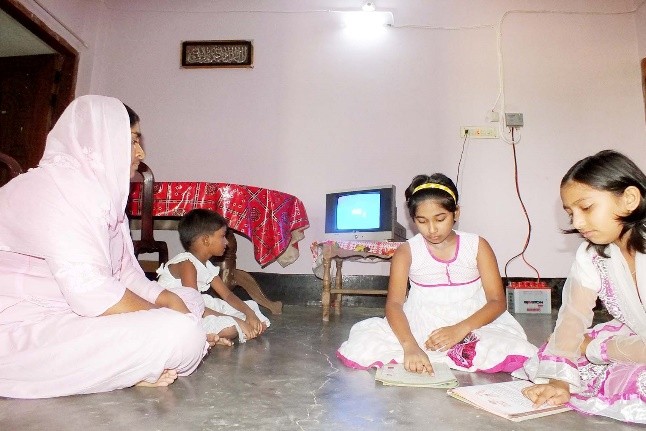Speeches Shim

December 2015—Tania Khatun and her family have seen their quality of life improve at the flip of a switch. No longer in the dark, she and her children are enjoying cooler nights and more enjoyable and productive evenings thanks to the sun’s rays collected through new solar panels.
A mother of four, Khatun lives in a small village in Madaripur, Bangladesh. Born into a family of farmers, she, like many of the other 1.2 million people in the district, does not have access to grid electricity. Since she is forced to rely on kerosene lamps and coal, simple everyday tasks such as cooking and reading are much more difficult.
According to the World Bank, access to grid electricity in Bangladesh remains limited, with roughly 45 percent of the population relying on off-grid power sources. Electricity access has long been recognized as a priority in the country, so in 1997, the Government of Bangladesh established the Infrastructure Development Co. Ltd. (IDCOL) to accelerate the development of medium to large-scale infrastructure and renewable energy projects.
As of 2014, about 3.25 million solar home systems have been installed in rural areas across the country, with each system costing approximately $100. While government-led programs are important, resources are limited and private sector solutions are needed to accelerate delivery of clean energy and energy access.
USAID’s Private Financing Advisory Network (PFAN)-Asia program helps developing clean energy companies find funding. Leading the way is MAKS Renewable Energy Co. Ltd., which has impacted 10,000 homes in rural Bangladesh with lighting and household items powered by solar energy.
“I’m very grateful to MAKS,” said Khatun, who has been using the company's items since 2013. “It is through their products we are getting good quality light at night so the children can do their homework and we now can enjoy watching the LED TV they provided. The solar-powered fan also keeps us cool.”
The company was established in 2009 and is the leading system integrator and IDCOL partner organization in Bangladesh working in the areas of off-grid solar home systems, grid-tied solar rooftop systems, solar irrigation pumps and rooftop solar and solar-powered appliances. This includes LED televisions, which use smaller, more efficient light-emitting conductors to illuminate the screen, and direct current fans, which are more efficient than regular fans.
MAKS learned about USAID’s PFAN-Asia program at the Sustainable Energy for All investment forum in Dhaka in February 2014, which was organized jointly with the U.S. Department of State and the Asian Development Bank. USAID helped MAKS improve their business plan and promote it to potential investors and is currently working with the company to raise an additional corporate investment of $2 million.
The PFAN-Asia program, which runs from 2013 to 2018, helps companies pitch their projects to investors and improve their work plans. The program is working to allocate at least $1 billion in funds directly or indirectly for clean energy investments that will avoid or reduce greenhouse gas emissions and increase access to more sustainable clean electricity. To date, the program has assisted 13 companies to mobilize clean energy financing worth a total of $165 million. The program also helps to create self-sustaining, long-term access to regional clean energy financing.
LINKS
Follow @USAIDAsia (link is external), on Facebook (link is external), on Flickr (link is external), on YouTube (link is external)

Comment
Make a general inquiry or suggest an improvement.